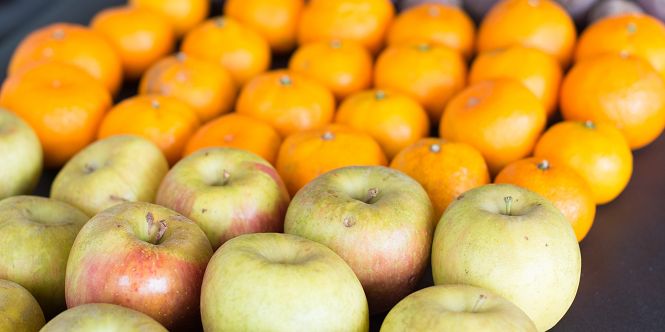Let's Connect
Our friendly and educated team is here to partner with you every step of the way. Connect today to learn of all the ways to partner with The Common Market.
Delivering local food for the common good.

by Jasmina Breen
At The Common Market, we’re aware that adopting a values-based approach to school food procurement – one that prioritizes community values, like supporting local businesses or climate, over price – can present unfamiliar challenges for school districts and their food service teams. We also know that once a program is in place, the benefits of local procurement can outweigh the burden of the initial effort it takes to implement. Values-based procurement strengthens communities, contributes to resilient local food economies, and positively impacts student health.
But, how do schools get there?
School districts often rely on formal public procurement processes to source food for school meal operations. In partnering with hundreds of districts throughout our regions to help meet their local and values-based purchasing goals, we have had the opportunity to review and respond to many formal contracts and solicitations. We read these contracts with our local farmers top of mind – flagging language that makes competition impossible or exceptionally challenging for our local farmers and producers to compete.
Many schools want to break the mold.
Districts throughout our regions have asked about inspiration from the field, inquiring about how other districts adjust contract language to diversify opportunities for small, local vendors, while meeting the demands of their school community and their values.
As part of our efforts to make this process a mutually beneficial one for our schools and our farms, we set out to do rigorous research – to scan the field. We spoke to school food staff and farmers across the country to understand what it takes to bring farm to school programs – ones that center on values including local communities, fair labor, environmental sustainability, animal welfare, and equity – to life. We analyzed over 50 public solicitations and identified key factors and processes for adoption and maintenance. The result? One of our latest resources: “Advancing School Food Procurement: Driving Values-Based Purchasing Through Competitive Solicitation”.
In this blog, we’ll explore the insights gained from our in-depth analysis of school food procurement practices and share some of the top takeaways from the report.
Let’s dive in.
Understand the Role of School Food Operations
The enormous potential for schools to impact local communities extends beyond the transactional aspect of procurement. Schools have tremendous purchasing power thanks to their large populations, which means a simple shift in procurement practices can have transformational effects on local food economies, benefiting both farmers and students.
The Common Market simplifies the process of sourcing high-quality local food by connecting the dots between schools and farmers to create new market opportunities and foster community health. By realizing the full value of a healthy food system, both sides of the spectrum can thrive.
Prioritizing Values
One of the key takeaways from our study was the importance of prioritizing values in school food procurement. With a wide range of possibilities to choose from, such as sustainability, quality, equity, and environmental impact, it becomes crucial for school food directors and communities to identify and clearly articulate their top priorities.
One method of aligning on values is by engaging stakeholders through community meetings and soliciting feedback to understand your specific demographic’s needs and expectations. We’ve also seen wellness policies succeed as a way of embedding values into procurement processes and justifying the inclusion of specific criteria in solicitations.
Cultivating Organizational Change
Embracing values-based procurement requires a parallel change in organizational culture. Procurement processes focused on values demand more effort and a different approach, which is why securing internal buy-in and ensuring all team members are supportive is essential.
Tools like the Impact Hub calculator from the Center for Good Food Purchasing can help quantify the potential impacts of local sourcing, allowing school food directors to make a persuasive case to decision-makers. Building community engagement, involving local policy-makers and stakeholders in the conversation, and referencing policies that incentivize good food purchasing with reimbursements can prove helpful for getting everyone in the district on board.
Engaging Farmers and Community
Community engagement is vital to successful values-based procurement. By creatively leveraging their role in the community and being vocal about their mission, schools can attract investments and distribution resources from local leaders and organizations to help support their efforts.
Meanwhile, engaging in conversations with farmers can foster a stronger sense of partnership and provide insights into their requirements and motivations to participate in school food procurement opportunities, which can influence the format of future solicitations.
Contract Language and Beyond
Changing contract language is an important step, but it’s just one piece of the puzzle. Altering contract language is insufficient without a comprehensive understanding of the supply chain at large, so you know what changes will be most effective.
For example, we consistently observed line-by-line bidding raised farmer participation. By structuring bids around singular food items or values, school districts can open opportunities for smaller and non-traditional vendors who might not have bandwidth to participate on a larger scale. This approach ensures vendors can participate based on their particular capabilities, leading to increased diversity and inclusivity. However, these insights and subsequent language shifts wouldn’t have been possible without insights from local farmers. It must start with a conversation.
Conclusion
Adopting values-based procurement practices allows school districts to build a resilient and sustainable food system that nurtures the well-being of their students and supports local agriculture. With that said, we know there’s a lot to figure out when it comes to making the dream of local procurement a reality in schools. We’re hopeful that this tool will make the journey toward a healthy, sustainable school food system easier for school food directors and your teams.
Our National Partnerships Director, Rachel Terry, recently had the opportunity to break down the resource for school districts on a quick webinar hosted by our partners at the Urban School Food Alliance. Check that out here!

Our friendly and educated team is here to partner with you every step of the way. Connect today to learn of all the ways to partner with The Common Market.
"The Common Market Texas is bringing critical support to our region of small farmers! Without [them], businesses like ours would have fewer options for growth. As a grower for and customer of The Common Market, the benefits of this organization's work is clear. They are creating greater and meaningful access to fresh, local food."
— Daniella Lewis, Plant It Forward Farms